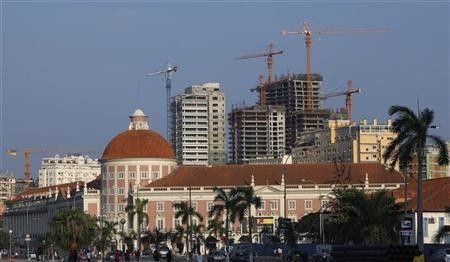Africa's Social Spillover: China Imports Crude From Angola, Exports Crime
ANALYSIS

Chinese investments are changing African society in more ways than one.
Criminal gangs, which are common in China, have apparently spilled over into the southwestern African country of Angola. Now, their illicit activities are threatening China's presence in the region.
A recent bust exposed the growing problem.
On Saturday, a group of 37 Chinese suspects arrived in Beijing after being extradited from Angola, where they allegedly perpetrated a litany of serious crimes against other members of the Chinese community, including human trafficking, forced prostitution, kidnapping, blackmail and robbery. They have yet to face trial.
According to the Xinhua news agency, the Chinese Ministry of Public Security reported that Chinese police, worked with Angolan security forces not only to detain the 37 suspects, but also to break up 12 criminal gangs, solve 48 criminal cases and rescue 14 Chinese victims.
Crime Crosses Continents
China is Africa's largest trade partner, and Angola's reserves of crude oil are of great interest to the Asian economic powerhouse. The Telegraph reports that 258,920 Chinese nationals are currently living in Angola; most have work visas.
But the recent crackdown shows that not all of those foreigners are there to make a profit through legal means.
Though Angola is the setting for this particular wave of crime, the problem is essentially a Chinese one, with Chinese nationals making up the bulk of both victims and perpetrators.
Drug and human trafficking are major problems in China.
Havocscope, a database on global crime rates, estimates that the value of China's black market stands around $251 billion. The problem is not helped by reportedly high levels of corruption in the Chinese government, which filters down to local officials and casts a shadow over many of the country's major corporations.
The issue was front-and-center over these past few months after the sacking of Bo Xilai, a populist Communist Party chief in the metropolis of Chongqing who made a name for himself by cracking down on organized crime. He was apparently involved in some shady dealings of his own -- his wife Gu Kailai was given a suspended death sentence on August 20 for her role in the murder of a British businessman who handled some of the family's personal affairs. Details, unsurprisingly, remain hazy.
Scene of the Crime
Angola has problems of its own. The country was embroiled in a civil war for 27 years until a peace agreement was finally reached in 2002; by that time, about 500,000 people had died. The violence goes back to colonial times, when tribal groups that fought against Portuguese control also vied for dominance over one another.
A formerly Marxist group called the People's Movement for the Liberation of Angola, or MPLA, emerged victorious after that decades-long struggle. In national elections, its lead remains insurmountable; it won 82 percent of a popular vote in 2008. But it has been criticized for the strength of its executive branch under President Jose Eduardo dos Santos, at the expense of the court system.
The administration has also been accused of muzzling the press and carrying out human rights abuses.
Angola's own crime problems have much to do with inequality. Oil discoveries over the last decade have made Angola the second-largest producer of crude on the continent, after Nigeria. It also boasts the fifth-largest economy in Africa, drawing billions of dollars in foreign investment each year.
Angola saw its GDP grow by double digits each year beginning in 2004, until the recession hit in 2008. (Growth then slowed to the single-digit range, but seems to be picking up again.)
But poverty still plagues the general population. Hunger remains a major problem, as do illiteracy rates, infant mortality, and a dearth of rural infrastructure. The government isn't neglecting these problems entirely, but progress has been slow.
Intercontinental Intermingling
In short, Angola is a troubled country that depends heavily on foreign investment in order to sustain the growth of its newfound wealth -- it has little incentive to meddle in the affairs of its metropolitan Chinese community.
And Angola's oil has in turn become a valuable resource for fuel-hungry China. But the recent crime bust shows that oil investors aren't the only ones crossing continental lines to make an easy living.
The cooperation of Chinese and Angolan security forces in the recent crime bust is encouraging, and the incident speaks to a larger truth about inter-continental commerce: economic relationships never occur in a bubble, as China's huge -- and ever-growing -- presence in Africa must include some consideration of the social spillover that can either help or hinder progress for both parties involved.
© Copyright IBTimes 2024. All rights reserved.






















